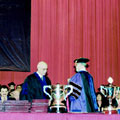|
|
 |
 |
 |
 |
 |
|
 |
 |
 |
 |
 |
|
 |
|
 |
|
 |
|
|
|
 |
|
|
|
 |
|
|
|
Graduate Diploma in Engineering
Engineering Courses (ENGR) |
|
Department of Engineering
School of Sciences and Engineering
Professors: A. Abdel Hamid, E. Fahmy (IEP Director), M. Farag (Vice Provost), S. El-Haggar, M. Haroun, E. Imam, S. Khedr (CENG Chair), M. Mansour, M. Serag El-Din (MENG Chair), E. Smith, M. Younan
Associate Professors: M. Abou-Zeid, H. Amer (EENG Chair), A. Ezeldin, L. Gaafar, M. Gadallah, A. Hassanein, K. Hekman, A. Nassef, A. Shalaby, A. Sherif
Assistant Professors: A. Essawi, A. Elezabi, H. Hegazi, H. Salem
Distinguished Lecturer: H. Elabd
Master of Science
The master of science program in Engineering is administered by the Interdisciplinary Engineering Programs (IEP). It provides a broad program for study in preparation for careers in advanced engineering areas. The graduate program covers several disciplines in engineering such as Construction Engineering, Design, Environmental Engineering, Industrial Engineering and Materials and Manufacturing.
Admission
A candidate for the master's program in engineering must have a degree in engineering. Students who have some deficiency in their undergraduate training but are well-qualified in other respects may be admitted provisionally. The IEP may prescribe a program of noncredit work to make up for the deficiency.
Courses (24 credit hours)
A minimum of eight courses (24 credit hours) is required. The courses are selected from the following categories:
I- Core Courses (9 credit hours)
All students select three out of the following four courses: |
|
|
ENGR |
511 |
Computational Methods in Engineering, 3 cr. |
|
ENGR |
512 |
Experimental Methods in Engineering, 3 cr. |
|
ENGR |
516 |
Engineering for a Sustainable Environment, 3 cr. |
|
ENGR |
517 |
Engineering Systems Design and Analysis, 3 cr. |
|
|
|
II- Concentration Courses (9 credit hours)
Students should select a minimum of three courses in one of the following specializations:
Construction Engineering
All students must take the following three courses: |
|
|
ENGR |
570 |
Advanced Construction Management, 3 cr. |
| |
573 |
Advanced Construction and Building Materials, 3 cr. |
| |
576 |
Advanced Systems for Construction, 3 cr. |
|
|
|
Design
|
|
|
ENGR |
522 |
Materials in Design and Manufacturing, 3 cr. |
| |
529 |
Failure Analysis and Prevention, 3 cr. |
| |
554 |
Advanced Stress Analysis in Design and Manufacturing, 3 cr. |
| |
555 |
Analysis and Design of Dynamic Systems, 3 cr. |
| |
557 |
Engineering Design Methodologies, 3 cr. |
| |
558 |
Applied Finite Elements Analysis for Engineers, 3 cr. |
|
|
|
Environmental Engineering
|
|
|
ENGR |
561 |
Water Quality Control, 3 cr. |
| |
562 |
Unit Operations in Environmental Engineering, 3 cr. |
| |
564 |
Air Pollution Control Engineering, 3 cr. |
| |
567 |
Environmental Chemistry, 3 cr. |
| |
569 |
Groundwater Hydrology and Contamination, 3 cr. |
|
|
|
Industrial Engineering
|
|
|
ENGR |
522 |
Materials in Design and Manufacturing, 3 cr. |
| |
526 |
Computer Methods in Materials Engineering, 3 cr. |
| |
529 |
Failure Analysis and Prevention, 3 cr. |
| |
541 |
Integrated Manufacturing Systems, 3 cr. |
| |
542 |
Total Quality Management, 3 cr. |
| |
543 |
Systems Modeling and O
Engineering
 |
|
|
 |
 |
|
|
 |
|
|
 |
 |
 |
 |
 |
|
 |
 |
 |
 |
 |
|
 |
|
 |
|
 |
|
|
|
 |
|
|
|
 |
|
|
|
Graduate Diploma in Engineering
Engineering Courses (ENGR) |
|
Department of Engineering
School of Sciences and Engineering
Professors: A. Abdel Hamid, E. Fahmy (IEP Director), M. Farag (Vice Provost), S. El-Haggar, M. Haroun, E. Imam, S. Khedr (CENG Chair), M. Mansour, M. Serag El-Din (MENG Chair), E. Smith, M. Younan
Associate Professors: M. Abou-Zeid, H. Amer (EENG Chair), A. Ezeldin, L. Gaafar, M. Gadallah, A. Hassanein, K. Hekman, A. Nassef, A. Shalaby, A. Sherif
Assistant Professors: A. Essawi, A. Elezabi, H. Hegazi, H. Salem
Distinguished Lecturer: H. Elabd
Master of Science
The master of science program in Engineering is administered by the Interdisciplinary Engineering Programs (IEP). It provides a broad program for study in preparation for careers in advanced engineering areas. The graduate program covers several disciplines in engineering such as Construction Engineering, Design, Environmental Engineering, Industrial Engineering and Materials and Manufacturing.
Admission
A candidate for the master's program in engineering must have a degree in engineering. Students who have some deficiency in their undergraduate training but are well-qualified in other respects may be admitted provisionally. The IEP may prescribe a program of noncredit work to make up for the deficiency.
Courses (24 credit hours)
A minimum of eight courses (24 credit hours) is required. The courses are selected from the following categories:
I- Core Courses (9 credit hours)
All students select three out of the following four courses: |
|
|
ENGR |
511 |
Computational Methods in Engineering, 3 cr. |
|
ENGR |
512 |
Experimental Methods in Engineering, 3 cr. |
|
ENGR |
516 |
Engineering for a Sustainable Environment, 3 cr. |
|
ENGR |
517 |
Engineering Systems Design and Analysis, 3 cr. |
|
|
|
II- Concentration Courses (9 credit hours)
Students should select a minimum of three courses in one of the following specializations:
Construction Engineering
All students must take the following three courses: |
|
|
ENGR |
570 |
Advanced Construction Management, 3 cr. |
| |
573 |
Advanced Construction and Building Materials, 3 cr. |
| |
576 |
Advanced Systems for Construction, 3 cr. |
|
|
|
Design
|
|
|
ENGR |
522 |
Materials in Design and Manufacturing, 3 cr. |
| |
529 |
Failure Analysis and Prevention, 3 cr. |
| |
554 |
Advanced Stress Analysis in Design and Manufacturing, 3 cr. |
| |
555 |
Analysis and Design of Dynamic Systems, 3 cr. |
| |
557 |
Engineering Design Methodologies, 3 cr. |
| |
558 |
Applied Finite Elements Analysis for Engineers, 3 cr. |
|
|
|
Environmental Engineering
|
|
|
ENGR |
561 |
Water Quality Control, 3 cr. |
| |
562 |
Unit Operations in Environmental Engineering, 3 cr. |
| |
564 |
Air Pollution Control Engineering, 3 cr. |
| |
567 |
Environmental Chemistry, 3 cr. |
| |
569 |
Groundwater Hydrology and Contamination, 3 cr. |
|
|
|
Industrial Engineering
|
|
|
ENGR |
522 |
Materials in Design and Manufacturing, 3 cr. |
| |
526 |
Computer Methods in Materials Engineering, 3 cr. |
| |
529 |
Failure Analysis and Prevention, 3 cr. |
| |
541 |
Integrated Manufacturing Systems, 3 cr. |
| |
542 |
Total Quality Management, 3 cr. |
| |
543 |
Systems Modeling and Optimization, 3 cr. |
| |
545 |
Production System Design, 3 cr. |
| |
548 |
Facilities Planning and Design, 3 cr. |
|
|
|
Materials and Manufacturing Engineering
|
|
|
ENGR |
521 |
Advanced Topics in Mechanical Behavior of Engineering Materials, 3 cr. |
| |
522 |
Materials in Design and Manufacturing, 3 cr. |
| |
523 |
Physical Metallurgy, 3 cr. |
| |
527 |
Composite Materials, 3 cr. |
| |
528 |
Advanced Testing and Evaluation of Materials, 3 cr. |
| |
529 |
Failure Analysis and Prevention, 3 cr. |
| |
541 |
Integrated Manufacturing Systems, 3 cr. |
|
|
|
III- Elective Courses (6 credit hours)
A minimum of two courses are selected as electives. The courses are selected from a set of graduate courses in engineering, physical sciences, social sciences, management and other related graduate level courses subject to adviser and IEP approval. No more than one 400-level course in engineering, computer science and other related areas, not in the student's undergraduate major, may be taken for graduate credit subject to adviser and IEP approval.
Students may also select from the following list of courses: |
| |
|
|
ENGR |
524 |
Electronic Phenomena in Solids, 3 cr. |
| |
525 |
Deformation and Fracture of Materials, 3 cr. |
| |
526 |
Computer Methods in Materials Engineering, 3 cr. |
| |
553 |
Advanced Computer Aided Design, 3 cr. |
| |
554 |
Advanced Stress Analysis in Design and Manufacturing, 3 cr. |
| |
565 |
Air Pollution and Combustion, 3 cr. |
| |
568 |
Noise Pollution Fundamentals, Measurements and Control, 3 cr. |
|
|
|
Construction Engineering students must select a minimum of one course from the following list:
|
|
|
ENGR |
571 |
Advanced Systems Analysis for Construction Engineering, 3 cr. |
| |
572 |
Claims and Disputes in Construction Industry, 3 cr. |
| |
574 |
Methods in Equipment for Construction, 3 cr. |
| |
575 |
Techniques of Planning, Scheduling and Control, 3 cr. |
| |
579 |
Protection and Repair of Structures, 3 cr. |
| |
592 |
Advanced Topics in Engineering, 3 cr., may include:
- Geotechnical Engineering
- Construction Technology: Analysis and Developments
- Advanced Structural Design and Construction |
|
|
|
Thesis
Graduate thesis work is an important and required part of the master's degree program. Each student must submit a thesis topic that has been approved by a faculty adviser by the end of the first academic year. Various research topics are discussed in ENGR 590 and 591, Graduate Thesis Seminar I and II. Students must register in ENGR 590 before submitting a thesis topic and in ENGR 591 during execution of the thesis research to present their thesis plan. To ensure adequate faculty consultation on the thesis, the student must register for ENGR 599, Graduate Thesis, by the completion of 18 credit hours. Students must register in ENGR 599 continuously and for at least two semesters. The first two registrations in ENGR 599 must be for three credit hours, after that ENGR 599 is taken for one credit hour each semester until completion of the program requirements.
Graduate Diploma in Engineering
Admission
Admission requirements are the same as those for the M.Sc. Program.
Courses (18 credit hours)
Course work for the diploma in engineering is directed at providing the student with background in subjects relevant to the designated engineering discipline. A total of six courses ( 18 credit hours) is required for the diploma.
The courses may be selected from the 500-level engineering courses offered. A minimum of three courses (9 credit hours) must be taken in a designated area. No more than one 400-level course, not previously taken, may be considered for credit.
The courses which have been successfully completed in the diploma program can be considered as part of the master's degree requirements for students who are admitted to the master's degree studies. The diploma program may be completed in one academic year; no thesis is required.
Engineering Courses (ENGR) |
|
|
|
|
|
 |
 |
|
Copyright © 2004-2005, The American University in Cairo |
|
|
| |
| | |
